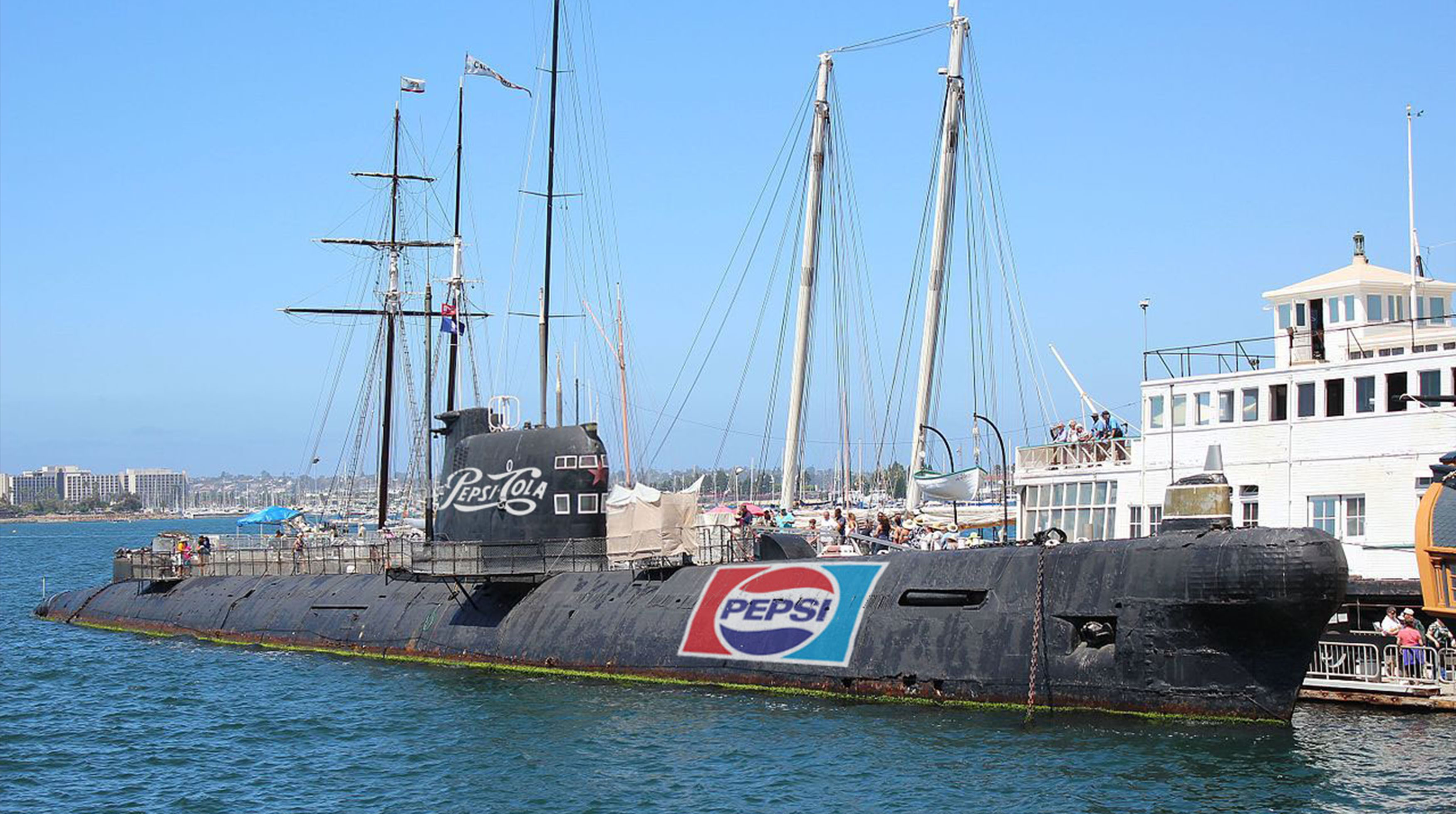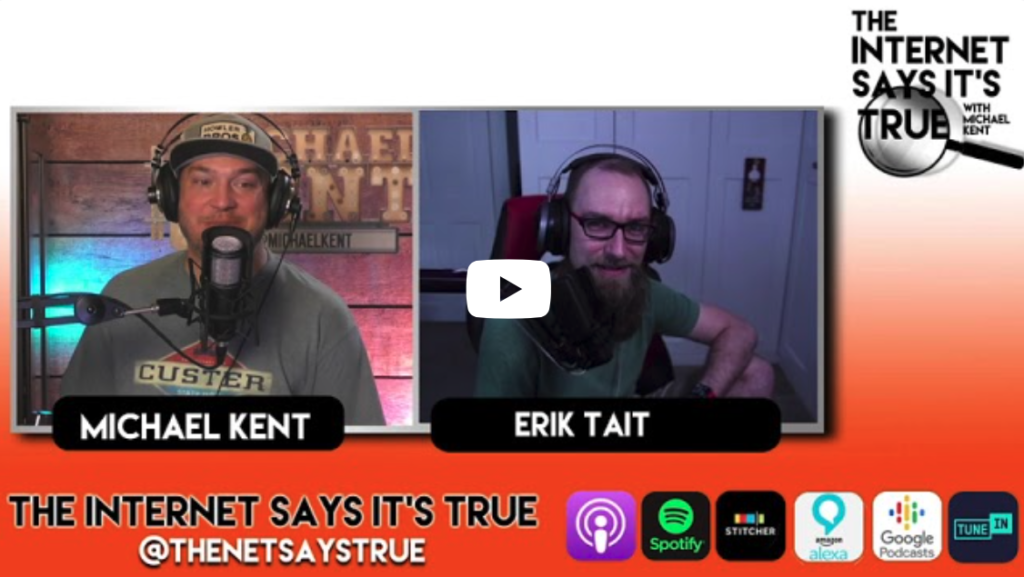The Pepsi Cola Navy: Soviet Trade Gone Strange – REWIND
Originally released August 30, 2021. For a very short time period, the Pepsi Cola Company had the sixth largest navy in the world. It was the result of a crazy trade deal with the Soviet Union and the Soviets’ love for the soft drink. In this episode, we explore how this came to be and then play the Quick Quiz game with Comedian & Magician Erik Tait!

In the summer of 1959, American Vice President Richard Nixon and Soviet First Secretary Nikita Khrushchev met inside a home in Moscow. They were followed by countless press secretaries and aides, and multiple television cameras, who would broadcast their meeting in color.
The home wasn’t real. It was an exhibition set up in Sokolniki Park to show off the American way of living to the Soviets. In addition to the model home, more then 450 American companies had booths set up to show off their products. A similar exhibition would be set up in New York City to show Americans the Soviet way of living. It was all part of the American National Exhibition, an effort to improve relations between the U.S. and the Soviet Union in a time when things were heating up between the two countries. The Intercontinental Ballistic Missile had just been invented. The two countries had very different ways of living, two very forms of government and economy and – in addition bringing in 3 million visitors who would marvel at the exhibit in Solkoniki Park, it would be the site of what became known as the Kitchen Debate between Nixon and Khrushchev
In front of television cameras, the two men walked around the American-style model home and debated the merits of Capitalism versus Communism. America was already becoming wary of the Soviets and their way of life. For the last decade the House UnAmerican Activities Committee had been seeking out and blacklisting people in Hollywood who they claimed had ties to Communism.
During the Kitchen Debate, Khrushchev condemned the Americans’ use of gadgets in the home, like the handheld lemon juicer. After some amount of bickering, the two men decided they should find areas where they agreed.
This is where we meet one of the key figures in our story – Donald Kendall. Kendall was the head of the Pepsi Cola Company’s International Operations and he was in the right place at the right time. As the debate between Nixon and Khrushchev was heating up, he helped to cool the tensions with a cold cup of Pepsi. Each of the men sipped the Pepsi and this led to an exchange about how Pepsi tasted just as good when made with water from Russia. Khrushchev loved the drink and a seed was planted.
At this point in the story, we have to skip forward a bit – which is hard because a LOT happened right after the American National Exhibition – Kennedy becomes President, the Cuban Missile Crisis, Kennedy is assassinated, Johnson becomes President, The War in Vietnam, USSR invades Czechoslovakia. We can’t get into all of that because for this story, we need to jump to 1972.
When Nixon became President, he was looking for ways to improve relations with the Soviets. At this point, the soviet leader was Leonid Brezhnev and the two countries came up with a deal to open 20 Pepsi Bottling plants in the Soviet Union. It would be the very first American product manufactured there. And part of the deal was that their rival, Coca Cola, couldn’t be marketed in the USSR.
Pepsi would ship over all the supplies needed to make cola with Russian water supplies and in return, well – the Soviet currency wasn’t worth anything outside of Russia. There weren’t enough American dollars in the Soviet Union to pay for their end of the trade deal. So what they came up with was something creative.
Stolichnaya Vodka was a company that was owned and controlled by the Soviet government. Pepsi was granted exclusive rights to import and market Stolichnaya in the U.S. The Soviets get Pepsi. The Americans get vodka. Seems like a good deal. And it was for awhile. But then geopolitical tensions got in the way again.
The USSR had invaded Afghanistan. The Americans helped the Afghans defend themselves. Now President Ronald Reagan and Soviet Leader Mikhail Gorbachev had been working to improve relations once again, but for the American public, the damage had been done. Many Americans refused to buy Soviet products – including Stolichnaya Vodka. As Reagan left office and George Bush became President, Pepsi wanted to build 26 more bottling plants in the Soviet Union, but the Pepsi for Vodka deal was no longer working. They needed to figure out another solution. And that brings us to one of the weirdest trade deals in history.
The Soviet Union’s invasion of Afghanistan had turned many Americans against buying Soviet-made products. So as a resul
no one was buying enough Stolichnaya Vodka to account for the amount of Pepsi being sent to Russia.
It was 1989 and there was one thing that Gorbachev’s government had a lot of: surplus military equipment. Pepsi’s Donald Kendall – by the way – was still involved. He was retired, but serving on the Board of Directors for PepsiCo. The deal that Gorbachev’s government came up with was to give Pepsi 17 diesel-powered attack submarines, a cruiser, a destroyer, a frigate and a few oil tankers. 20-some ships in all. Pepsi accepted. This raised more than a few red flags with the American government.
But here’s the thing – these ships were pretty much all obsolete. These loud diesel submarines had been replaced by quieter nuclear powered subs. The ships were old, rusty and hardly usable. Even so, the government didn’t like the idea of a corporation holding such a large naval fleet. That’s where we get this amazing quote from none other than Pepsi’s Donald Kendall. He said to the Pentagon, “I’m dismantling the Soviet Union faster than you are.”
The ships weren’t sea-worthy. Most of them listed to one side. They were only valuable for scrap. So as soon as they could, Pepsi sold the ships to a Swedish company for recycling and used that money to fund their shipping and bottling operations in the Soviet Union. But here’s the punchline. And this is true. For a short time. From the time they received the ships to the time they sold them, The Pepsi Cola Company was the Sixth Largest Naval Military in the World.

Review this podcast at https://podcasts.apple.com/us/podcast/the-internet-says-it-s-true/id1530853589
Check out The Power of the Streak at https://www.amazon.com/POWER-STREAK-Consistent-Exercise-Motivated/dp/B0BRDD3QLH
Bonus episodes and content available at http://Patreon.com/MichaelKent
For special discounts and links to our sponsors, visit http://theinternetsaysitstrue.com/deals

